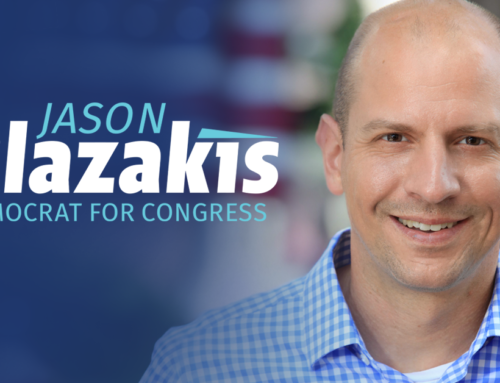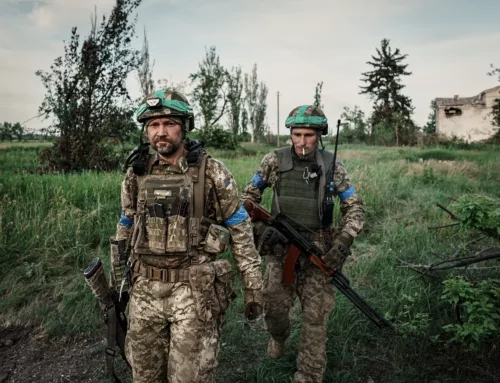President Biden was greeted like a hero, and rightly so, for his bold trip to Ukraine on Monday. The country’s political leadership, civil society and average citizens were united and energized by the American president’s visit in the middle of a deadly war.
Contrast that with the visit by two U.S. senators, Jeanne Shaheen (D-N.H.) and Dick Durbin (D-Ill.), to Tbilisi, Georgia, on the same day. While the president of Georgia, largely a figurehead position, and the prime minister, met with the two American visitors, many senior officials of the Georgian government and members of the ruling Georgian Dream party snubbed them.
The disparity underscores the depth of Georgia’s problems. Ever since Georgian Dream won elections for the parliament and then president in 2012 and 2013, respectively, Georgia has fallen under the influence of billionaire Bidzina Ivanishvili, who made his fortune in Russia and served for a year as Georgian prime minister. Ivanishvili is widely seen as the power behind the government throne, despite claiming that he was done with politics. And the country has fallen more deeply under the Kremlin’s influence and distanced itself from the West.
It is time for the United States to impose costs on individual Georgians who have tried to subvert the country’s democratic progress, starting with Ivanishvili. Go after the biggest fish, and the others will get the message. The United States has already done this for two other regional EU aspirants, Ukraine and Moldova.
In the decade since Georgian Dream rose to power, relations with Moscow have improved. Not even Russia’s brutal invasion of Ukraine interrupted this trajectory. Georgia’s relations with Ukraine, the European Union, and the United States, meanwhile, have deteriorated.
Ukraine withdrew its ambassador to Tbilisi to protest the Georgian government’s lack of support. The European Union last summer extended candidate status to Moldova and Ukraine, but not to Georgia. Meanwhile, the United States has become a punching bag for Georgian government and party officials, with the U.S. Ambassador Kelly Degnan, and other Americans, being frequent targets of unprecedented rhetorical attacks.
Some Georgian Dream representatives absurdly accuse the United States of wanting to bait Georgia into the war between Russia and Ukraine. In our view, nothing could be further from the truth; widening the war is the last thing the West wants to see.
Borrowing a page from the Kremlin playbook, the Georgian parliament is on the verge of passing legislation that would brand civil society organizations (nonprofit advocacy organizations) that receive more than 20 percent of their funding from outside the country “foreign agents.” Given the lack of domestic donors, due in part to their fear of getting crosswise with the government, many such organizations are increasingly reliant on outside largesse to survive. Asked last week about the proposed legislation, U.S. State Department spokesman Ned Price said it “would stigmatize and silence independent voices and citizens of Georgia who are dedicated to building a better future for their own communities.”
Civil society representatives met the visiting U.S. senators — the same civil society that is under attack from the Georgian government. The government rejected the senators’ request to visit the country’s ex-president, Mikheil Saakashvili, who has reportedly been horrendously treated in prison for the past 17 months.
Saakashvili, who was arrested shortly after returning to Georgia in October 2021, is in critical condition after appalling mistreatment by Georgian officials and reported denial of proper medical care. Georgian authorities have reportedly refused to release him on humanitarian grounds. And since Saakashvili previously lived in Ukraine, officials there have taken an interest in his welfare, despite their focus on the war, and called for him to be returned to Ukraine, adding to tensions between Kyiv and Tbilisi.
While the Georgian population remains strongly pro-Western, interested in joining both the EU and NATO, its government tilts more toward Moscow. Such leanings risk weakening Georgia’s support for a Euro-Atlantic orientation and subordinating the country to a Russian sphere of influence. This marks an incredible turn of events, given that Russia invaded Georgia in 2008 and occupies 20 percent of the country’s territory. One would think this would unite the governments in Tbilisi and Kyiv, but not under the current Georgian leadership. Instead, Georgian Dream rejected an invitation to join others in Kyiv this week to mark the one-year anniversary of Russia’s invasion.
The country’s president, Salome Zurabishvili, is on the outs with Georgian Dream but lacks the power to effect real change. She could pardon Saakashvili but has so far decided against taking such a step.
In response to this deteriorating situation, the European Parliament has passed non-binding resolutions calling for sanctions against Ivanishvili and condemning Saakashvili’s poor treatment. Shaheen has proposed conditioning U.S. assistance to Georgia on ending the democratic backsliding. This explains, in part, the cold shoulder she received during her visit.
So far, neither the EU nor the United States has imposed any sanctions on Georgian individuals responsible for the current state of affairs. Now is the time to do so.
Visits to Tbilisi by senior U.S. officials these days are rare, with most of the focus on Russia’s invasion of Ukraine. In the past, when U.S. senators would travel to Georgia, they would be welcomed by all Georgians regardless of political affiliation. Those days are over. Unless the West takes action quickly, we may be asking, “Who lost Georgia?”
Crowded GOP field won’t save Trump — because it won’t lastAging presidents, cognitive acuity & reelection





